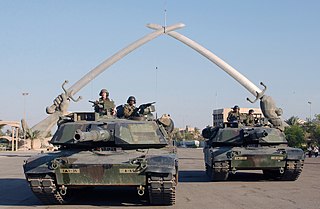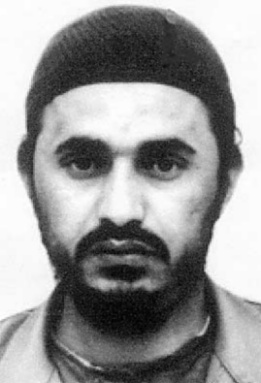Related Research Articles

Sadr City, formerly known as Al-Thawra and Saddam City, is a suburb district of the city of Baghdad, Iraq. It was built in 1959 by Prime Minister Abdul Karim Qassim and later unofficially renamed Sadr City after Ayatollah Mohammad Mohammad Sadeq al-Sadr.

The following is a timeline of major events during the Iraq War, following the 2003 invasion of Iraq.

The Canal Hotel bombing was a suicide truck bombing in Baghdad, Iraq, in the afternoon of August 19, 2003. It killed 22 people, including the United Nations' Special Representative in Iraq Sérgio Vieira de Mello, and wounded over 100, including human rights lawyer and political activist Amin Mekki Medani. The blast targeted the United Nations Assistance Mission in Iraq created just five days earlier. The 19 August bombing resulted in the withdrawal within weeks of most of the 600 UN staff members from Iraq. These events were to have a profound and lasting impact on the UN's security practices globally.

Baqubah is the capital of Iraq's Diyala Governorate. The city is located some 50 km (31 mi) to the northeast of Baghdad, on the Diyala River. In 2003 it had an estimated population of some 280,000 people.

The 7th Cavalry Regiment is a United States Army cavalry regiment formed in 1866. Its official nickname is "Garryowen", after the Irish air "Garryowen" that was adopted as its march tune. The regiment participated in some of the largest battles of the Indian Wars, including its famous defeat at the Battle of Little Bighorn, where its commander Lieutenant Colonel George A. Custer was killed. The regiment also committed the Wounded Knee Massacre, where more than 250 men, women and children of the Lakota were killed.
Events in the year 2004 in Iraq.

The First Battle of Fallujah, code-named Operation Vigilant Resolve, was an operation against militants in Fallujah as well as an attempt to apprehend or kill the perpetrators of the killing of four U.S. contractors in March 2004.

Jama'at al-Tawhid wal-Jihad, abbreviated as JTJ or Jama'at, was a Salafi jihadist militant group. It was founded in Jordan in 1999, and was led by Jordanian national Abu Musab al-Zarqawi for the entirety of its existence. During the Iraqi insurgency (2003–11), the group became a decentralized network with foreign fighters with a considerable Iraqi membership.
Events in the year 2005 in Iraq.

The Battle of Abu Ghraib took place between Iraqi Mujahideen and United States forces at Abu Ghraib prison on April 2, 2005.
The following lists events that happened during 2006 in Iraq.

Abu Musab al-Zarqawi, born Ahmad Fadeel al-Nazal al-Khalayleh, was a Jordanian jihadist who ran a terrorist training camp in Afghanistan. He became known after going to Iraq and being responsible for a series of bombings, beheadings, and attacks during the Iraq War, reportedly "turning an insurgency against US troops" in Iraq "into a Shia–Sunni civil war". He was sometimes known by his supporters as the "Sheikh of the slaughterers".

Operation Imposing Law, also known as Operation Law and Order, Operation Fardh al-Qanoon or Baghdad Security Plan (BSP), was a joint Coalition-Iraqi security plan conducted throughout Baghdad. Under the Surge plan developed in late 2006, Baghdad was to be divided into nine zones, with Iraqi and American soldiers working side by side to clear each sector of Shiite militias and Sunni insurgents and establish Joint Security Stations so that reconstruction programs could begin in safety. The U.S. military commander in Iraq, David Petraeus, went so far as to say Iraq would be "doomed" if this plan failed. Numerous members of Congress stated the plan was a critical period for the U.S. presence in Iraq.

The Diyala province campaign was a series of operations conducted by coalition forces against Iraqi insurgents and a number of bombing and guerrilla attacks against the security forces in Diyala Governorate of Iraq, with the purpose of control of the province.

The Battle of Baqubah II took place during the Iraq War in the capital of the Iraqi province Diyala, to the north-east of Baghdad. It began in early March 2007, when U.S. and Iraqi forces commenced preliminary operations to "establish a presence in Diyala beyond their Forward Operating Base".

Operation Phantom Strike was a major offensive launched by the Multi-National Corps – Iraq on 15 August 2007 in a crackdown to disrupt both the al-Qaeda-affiliated Islamic State of Iraq and Shia insurgent operations in Iraq. It consisted of a number of simultaneous operations throughout Iraq focused on pursuing remaining ISI terrorists and Iranian-supported insurgent groups. It was concluded in January 2008 and followed up with Operation Phantom Phoenix.

Tanzim Qaidat al-Jihad fi Bilad al-Rafidayn, more commonly known as Al-Qaeda in Iraq, was a Salafi jihadist organization affiliated with Al-Qaeda. It was founded on 17 October 2004, and was led by Abu Musab al-Zarqawi and Abu Ayyub al-Masri until its disbandment on 15 October 2006.
Operation Phantom Phoenix was a major nationwide offensive launched by the Multinational Force Iraq (MNF-I) on 8 January 2008 in an attempt to build on the success of the two previous corps-level operations, Operation Phantom Thunder and Operation Phantom Strike and further reduce violence and secure Iraq's population, particularly in the capital Baghdad. The offensive consisted of a number of joint Coalition and Iraqi Army operations throughout northern Iraq as well as in the southern Baghdad Belts.
The 2008 Nineveh campaign was a series of offensives and counter-attacks between insurgent and Coalition forces for control of the Nineveh Governorate in northern Iraq in early-to-mid-2008. Some fighting also occurred in the neighboring Kirkuk Governorate.
References
- 1 2 "Fast Facts: Abu Musab al-Zarqawi". Fox News. Associated Press. 8 June 2006. Archived from the original on 9 February 2013. Retrieved 29 December 2014.